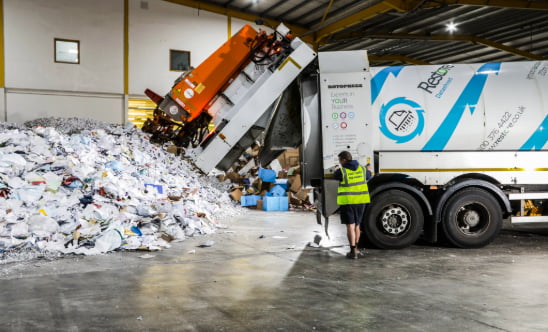Is your business overflowing with data? We know it’s surprisingly difficult to track always knowing when it’s finally time to say goodbye to old documents. Whether you’re running a fast-paced startup or managing a multi-site organisation, you’re likely sitting on a pile of records that are quietly gathering dust and potentially creating risks.
So, when should you dispose of records you no longer need? The answer isn’t always clear-cut. There are legal timelines, industry standards, internal policies, and good old-fashioned common sense to consider. We unpack those layers and help businesses make informed, confident decisions about record disposal.

Legal and regulatory timelines
Let’s start with the basics, compliance. Most businesses are bound by a range of legal requirements that dictate how long they must keep records. The General Data Protection Regulation (GDPR) plays a central role. Under its “storage limitation” principle, personal data should only be retained for as long as it is necessary for the purpose for which it was collected. Retaining information beyond this point can place an organisation at risk of non-compliance.
Then there are industry-specific rules. For example:
HMRC expects financial records like tax returns and payroll information to be stored for at least six years (HMRC guidance).
Medical and healthcare providers typically fall under NHS guidelines, where some patient records must be kept for decades. More here.
Finance and insurance businesses must follow FCA rules, often requiring retention periods of five to seven years for certain records.
The takeaway? A proper document retention policy should spell out exactly how long different types of documents should be kept.
Operational considerations
Audit preparedness: You may want to keep records on hand in case of future audits.
Legal defence: Old contracts or communication records could be valuable if you ever need to defend a claim
Internal reference: Historical data can help you understand trends, benchmark performance or guide future strategy.
Triggers that signal it’s time
Office relocations: Moving to a new space? It’s the perfect time to shed unnecessary paperwork.
Digital transformation projects: Migrating to cloud-based systems? That paper archive might not need to make the journey.
Post-acquisition changes: Mergers and acquisitions often prompt a clean-up of redundant records.

Risks of holding on too long
- Data breaches: The longer you store sensitive information, the more exposure you create. If those records fall into the wrong hands, you could face significant fines and reputational damage (ICO guidance)
- Legal liability: Retaining documents beyond their statutory period could complicate litigation. If challenged, you may be forced to produce irrelevant or damaging information.
- Clutter and inefficiency: Delay searches and slow productivity.
Why routine disposal is good business
Proactively disposing of unneeded documents isn’t just a tick-box exercise; it offers clear business benefits. For starters, lower storage costs. Whether you’re paying for off-site storage or using valuable office real estate, holding onto documents you don’t need is an unnecessary expense. Beyond that, it leads to enhanced data security. Eliminating outdated records reduces your attack surface and helps keep your systems lean. You’ll also gain operational clarity because a well-maintained records system means staff spend less time searching for information. Finally, there are significant sustainability gains to be made. Shredded paper doesn’t have to go to waste; partnering with a service that recycles responsibly reduces your environmental impact.
Find out moreThe role of a retention policy
One of the best ways to get a handle on document disposal is by developing a clear, practical retention policy. This should outline:
- The categories of records your business keeps
- Where and how they are stored
- Minimum and maximum retention periods
- Disposal methods and security measures
Crucially, this policy should be reviewed regularly and adapted when laws change or new risks emerge. It’s not just a document for the compliance officer’s drawer, it should be an active part of how your business manages data. For guidance, see The National Archives’ Records Management Code.
Secure disposal: Why It matters
Whether you're dealing with client contracts, HR records, or financial files, proper destruction is essential. Partnering with a certified shredding provider like Restore Datashred ensures that your information is destroyed in line with BS EN 15713:2023 standards – the gold standard for secure destruction.
A clear chain of custody, with waste transfer notes and Certificates of Destruction for every job

Assurance that data is destroyed completely, not just discarded

Peace of mind that your brand reputation is protected

Support for your sustainability goals through secure recycling

A note on digital records
While this article has focused largely on physical documents, it’s worth mentioning that digital files need the same level of attention. The same rules apply: keep them only as long as you need, and make sure they are securely deleted when the time comes.
This might mean:
- Regularly reviewing shared drives and cloud folders
- Wiping redundant hard drives and devices
- Using data destruction software to ensure files can’t be recovered
For secure media disposal, refer to NCSC’s media sanitisation guidance. Again, a good document destruction partner can help here, especially with hard drive shredding and IT asset disposal.
Clarity over clutter
Knowing when you should dispose of records can feel like a minefield, especially when regulations, technology, and business needs keep shifting. But with the right processes, policies, and partners in place, it doesn’t have to be.
Doing your best to stay on top of your record lifecycle and making sure that you are disposing of documents in a timely, compliant, and secure manner, will reduce risk, free up space, cut costs, and boost efficiency, and we’re here to help.Restore Datashred proudly provides certified and secure document destruction services for businesses across the UK. So, whether you require one time shredding for a quick file purge or regularly scheduled collections, we can help you. Contact us to help you do it safely, responsibly, and with total peace of mind.
Contact us Customer Login
Customer Login


